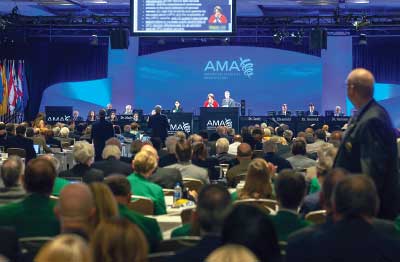AMA House Approves Aggressive Policy on Gun Violence
Abstract
The wide-ranging policy recommendations include support for gun “buy-back” programs and research to determine whether such programs are effective in reducing firearm-related injuries and death.
The AMA House of Delegates approved a sweeping set of recommendations last month aimed at reducing gun violence, including calling for the licensing and registration of all firearms.

At the House’s Annual Meeting in Chicago, delegates approved a resolution that “supports appropriate legislation that would restrict the sale and private ownership of inexpensive handguns commonly referred to as ‘Saturday night specials,’ large-clip automatic and semi-automatic firearms, or any weapon that is modified or redesigned to operate as a large-clip, high-rate-of-fire automatic or semi-automatic weapon.” The resolution further calls for a ban on the sale and ownership of all “assault-type weapons, bump stocks and related devices, high capacity magazines, and armor-piercing bullets.”
The same resolution also advocates requiring all owners of firearms to complete a course in gun safety, obtain a license, and register their firearms.
Gun rights are as fraught a subject within the House of Delegates as the subject is in the larger culture, and the resolution was hotly debated with many gun-owning physicians arguing for and against it.
But the number and scope of firearm-related resolutions introduced during the meeting reflected a growing sense of urgency among physicians about what they regard as a public health crisis, and even the licensing and registration resolution was ultimately approved by a comfortable margin in the 600-plus member House.
“It’s clear the House of Delegates is very concerned about what is happening to our patients and to our patients’ families,” Jerry Halverson, M.D., told Psychiatric News. “This was a very aggressive set of recommendations, but they fall in line with previous AMA policy that gun violence is a public health issue. Delegates clearly feel that in order for us to get better control on this problem, we need better control on guns.”
Beginning in November at the Interim Meeting of the AMA, Halverson will be the new chair of the AMA Section Council on Psychiatry. He succeeds past APA President Carolyn Robinowitz, M.D.
(For a list of other mental health–related items approved by the House, see box on page 4).
The tenor was established at the opening of the meeting in an address by outgoing AMA President David O. Barbe, M.D., who noted that the Pulse Nightclub shooting had taken place two years earlier in Orlando just as the House was opening its 2016 meeting in Chicago. “In the two years that have passed, we have been horrified by yet more carnage: in Parkland, Sutherland Springs, Santa Fe, and Las Vegas. And those are just a few of the incidents that made headlines. On average, gun violence claims the lives of nearly 100 people a day in the United States.
“People are dying of gun violence in our homes, churches, schools, on street corners, and at public gatherings,” Barbe said. “[T]he fact that this problem continues to worsen has spurred a new sense of urgency in this House, even while Congress fails to act. … While we will not all agree on every proposal introduced on gun violence, we can all agree that the issue must be addressed … and that the only responsible way forward is for women and men of good faith to continue to search for and advocate science-based solutions.”
Other firearm-related proposals approved by the House include separate resolutions supporting the concept of gun buy-back programs and research to determine the effectiveness of programs to reduce firearm injuries and deaths as well as advocating for schools to remain gun-free zones except for school-sanctioned activities (such as shooting competitions or drills at military schools) and on-site professional law enforcement officials. The latter resolution also opposes requirements or incentives for teachers to carry weapons.
Additionally, the House approved a report from the Council on Science and Public Health titled “The Physician’s Role in Gun Violence” that calls for the following:
Establishing laws allowing family members, intimate partners, and law enforcement personnel to petition a court for the removal of a firearm when there is a high or imminent risk for violence.
Prohibiting persons who are under domestic violence restraining orders or have been convicted of misdemeanor domestic violence crimes or stalking from possessing or purchasing firearms.
Expanding domestic violence restraining orders to include dating partners.
Requiring states to have protocols or processes in place for requiring the removal of firearms from prohibited persons.
Requiring domestic violence restraining orders and gun violence restraining orders to be entered into the National Instant Criminal Background Check System.
Some of the most impassioned testimony came from physicians who had been touched—professionally or personally—by gun violence.
“As a general surgery resident, I, along with my colleagues, take care of patients injured by firearms on a daily basis,” said Michael Metzner, M.D., speaking for the Resident and Fellow Section. “As a medical student, I was hours away from being a victim at the [Pulse nightclub] Orlando shooting, with some of my own friends killed and my Orlando community turned upside down. More recently, I was one of the general surgery residents in the trauma bay for children shot in Sutherland Springs, where we were able to save most, but not all. These stories are a testament to the gun violence epidemic and public health crisis we have today in the United States.”
In the last two decades, the makeup of the House of Delegates has become younger and more diverse, a remarkable transformation from the image of the AMA in prior decades, and this changing demographic is reflected in an increasing focus on public health–related policies.
“The resolutions on gun violence at this meeting are further evidence that this is not your father’s AMA,” Halverson said. ■
All reports and resolutions approved by the House of Delegates can be accessed here.
See also ‘Delegates Take Action on Issues Related to Mental Health’.



